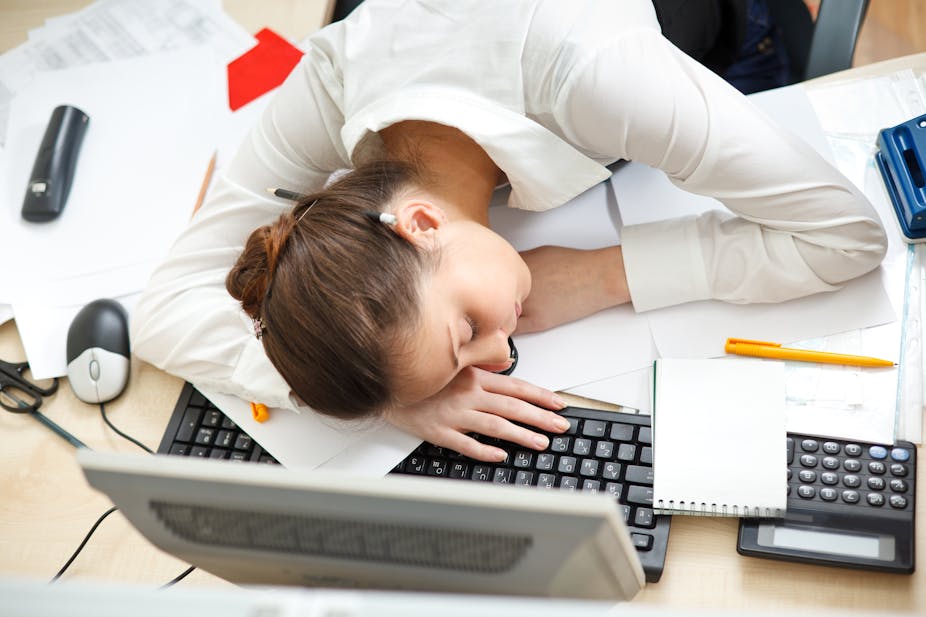Rest “is for wimps” – or so many would have us believe. In a world where “time is money” and there “aren’t enough hours in the day”, hard-working people are sleeping less and working more.
This in itself is not a new issue of course. For well over a decade now the declining sleep habits of the working population have come under increasing scrutiny. Occasionally this has been in response to tragedies such as the Selby rail crash, caused by a driver falling asleep at the wheel and crashing onto a railway track. Or, more recently, the death of Merrill Lynch intern Moritz Erhardt from a seizure that was closely related by many to the fact that he had been regularly pulling all-nighters to keep up with his workload.
Not a moral or health concern
More often than not, however, the question that has been posed has been an economic, rather than a moral one. Usually it takes one of two forms. The first is along the lines of: “Are we too tired to be sufficiently effective or productive in the workplace?” The second, seemingly antithetical one is: “How can we avoid sleep in order to be more visible, and therefore successful, in our work?”
These two questions are not as different as they might first appear, however. Well not in the eyes of a burgeoning sleep industry, anyway. For both questions can be addressed through an extension of the logic of resource efficiency that already underpins the realm of economic activity.
Capitalising on our lack of sleep
In fact, sleep, like so many things, is increasingly being transformed into a category of capital; one to be invested in, managed and ultimately exchanged when suitably advantageous. In order to successfully manage our sleep capital we need, of course, to draw on the right managerial tools and resources. So while the recently launched Apple Watch may not monitor the quantity and quality of your sleep, there are plenty of other devices available to do just that.
Enter any health food shop or pharmacy and marvel at the range of natural and synthetic sleep medicines, from simple relaxants to anti-snoring devices and related mechanical paraphernalia on offer. For those in need of more specialist skills, or for those on the go, help is also at hand from self-help sleep manuals through to the services of sleep clinics and consultants, to the provision of sleep stations, sleep pods and sleep chairs designed more often than not for the busy worker in need of a “recharge”.
Not that this makes getting a sufficient amount of sleep any more acceptable. As Max Weber once observed, right from its inception the culture of capitalism viewed “more sleep than is necessary for health” as not only unproductive, but worthy of “absolute moral condemnation”.
Making sleep productive
And today this hostility to sleep is perfectly encapsulated by the often macho posturing that takes place when issues of sleep and work are discussed. Physical and social scars left by the later one goes to bed and the earlier one rises – to catch up on email and make international calls, to be more productive – are worn as badges of bleary-eyed honour.
This kind of scrutinising brings sleep out of the realm of the unproductive and makes it a productive entity, either by virtue of the market it creates for sleep-related products or by reconceptualising it as a managed resource that can be cashed in on for greater alertness and performance at work.
Be it a power nap in the office sleep pod or the consumption of performance enhancing drugs such as Modafinil, this attitude to sleep exemplifies an unhealthy, market-driven attitude to our bodies, where even the sleep we need becomes an economic good to be resourced, monitored, worked at and controlled in order to ensure each one of us can get ahead of the pack.
As we well know though, we can’t all be out in front despite what they try to tell us. And no matter how efficiently we manage our sleep, be it though power napping, consuming pills and potions, or seeking expert advice, enough sleep remains a basic physiological need.
So, while our employers increasingly demand more of our time and, in turn, markets offer us new ways to sleep less but more efficiently, the concern must be for the working body; one that is becoming increasingly drained and distorted by its assimilation into market calculations of utility and exchange. And I don’t know about you, but frankly the thought of it leaves me feeling shattered.

